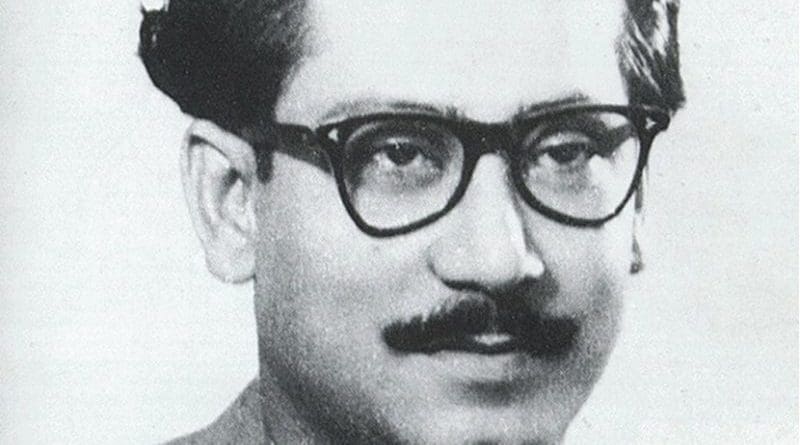‘Mujib’: Distorting Historical Realities For Propaganda? – OpEd
By Dr. Sahibzada Muhammad Usman
Cinema, throughout history, has not just been a source of entertainment, but also a reflection of societal attitudes, biases, and more importantly, historical perspectives. When a movie claims to portray true events, especially those tied to national histories and identities, it bears a significant responsibility. “Mujib”, a collaborative endeavor between India and Bangladesh, promised to shed light on the life of Sheikh Mujibur Rahman, the founding father of Bangladesh. However, upon close examination, the movie appears to be embroiled in controversies surrounding its narrative.
Every film, especially one rooted in history, takes certain cinematic liberties. However, there’s a fine line between dramatization and misrepresentation. “Mujib” appears to blur this line by veering away from well-documented events to paint a picture that serves a different narrative. By doing so, the film not only misguides its audience but also does a disservice to the legacy of Sheikh Mujibur Rahman and the rich history of Bangladesh.
It’s not uncommon for movies to be used as vehicles for propaganda. “Mujib”, unfortunately, seems to capitalize on this tradition. By presenting Pakistan in an unduly negative light, it seems to amplify the geopolitical tensions between the nations. Such a portrayal not only widens the rift but also prevents any potential dialogue and understanding between the two neighbors.
In the digital era, where information travels faster than light, the implications of disinformation are profound. Cinema is no exception. “Mujib”, by presenting a skewed narrative, contributes to the growing mire of disinformation. Misinformed opinions, once formed, are challenging to correct, leading to long-term misconceptions and biases among the audience. One of the most alarming impacts of “Mujib” is its potential to inflame regional animosities. By presenting a narrative rooted in prejudice, the film could inadvertently fan the flames of distrust and animosity among the people of South Asia. Such negative portrayals are detrimental to the collective growth and understanding of the region.
While the movie fixates on the alleged historical transgressions of Pakistan, it remains conspicuously silent about significant human rights issues in its backyard. The longstanding conflict in IIOJK and reported human rights abuses demand global attention. By focusing the narrative on historical events, “Mujib” cleverly diverts attention from these pressing issues, thus perpetuating a cycle of ignorance and inaction. Cinema wields the power to shape perceptions, influence opinions, and even alter the course of history. This immense power comes with an equally significant responsibility. While “Mujib” showcases the collaboration between two nations, its narrative responsibility seems amiss. Directors, producers, and audiences must recognize the impact of such films and push for realism and equity in their portrayals.
“Mujib” presents a unique perspective, although every account has multiple layers. The digital age has democratized information access, allowing viewers to engage with diverse viewpoints. This also means that audiences are constantly exposed to several storylines, some of which may be biased or misleading. As recipients of this information, audiences must actively participate in critical thinking. They must evaluate content and cross-reference information to distinguish truth from propaganda. Films, especially historical ones, shape future generations. Misrepresentations can distort history and instill scepticism and animosity in young people. The term “Mujib” may be used by someone unfamiliar with historical events to skew their understanding. India and Bangladesh’s agreement to create “Mujib” was a political and cultural milestone. These collaborations can bridge gaps and promote understanding. However, these narratives must be neutral and factual.
Leveraging such collaborations for propaganda can jeopardize the very essence and potential benefits of such initiatives. Historical films like “Mujib” serve as a testament to the events of the past. They carry the weight of representing events and personalities that have shaped the destinies of nations. It’s paramount that such movies present a balanced, well-researched narrative. Filmmakers, producers, and even sponsors should prioritize historical accuracy over political or personal agendas, ensuring that cinema remains a beacon of truth and authentic storytelling.
While “Mujib” represents a commendable effort in collaborative filmmaking, it underscores the challenges faced in portraying historical events with integrity. As the lines between entertainment, information, and propaganda become increasingly blurred, the onus is on both creators and consumers to ensure that the narratives they craft or consume are rooted in truth. In a world where information is abundant yet fragmented, it’s more important than ever to approach every story, every film, with a discerning eye and an open mind.


It’s a stark rebuke to those who once oppressed their own people, and now, after an inordinate delay, choose to honor a leader this region sorely needed – a caliber of leader that Pakistan has never seen and perhaps never will.
The afflicted have no need for propaganda, but those who systematically attempt to erase a people’s culture, identity, and very right to exist certainly do.